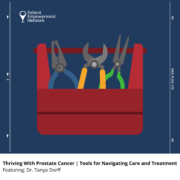How Can a Multi-Disciplinary Team Benefit Prostate Cancer Patients?
How Can a Multi-Disciplinary Team Benefit Prostate Cancer Patients? from Patient Empowerment Network on Vimeo.
A prostate cancer multi-disciplinary team can benefit patient care. Watch as expert Dr. Yaw Nyame explains the typical steps taken through prostate cancer care and how the team members can vary for localized prostate cancer versus advanced prostate cancer.
See More From Best Prostate Cancer Care No Matter Where You Live
Related Resources:

|
Transcript:
Sherea Cary:
What does a multi-discipline approach to prostate cancer look like?
Dr. Nyame:
Well, when you think about prostate cancer and how it’s diagnosed and how it’s treated, you’re talking about a process that involves a team, the process often starts with your primary care physician, he or she may order a PSA test, which will prompt a biopsy if it’s positive. So that’s the step one is that relationship you have with your primary care physician. Step two is going to be your urologist, that’s the person that’s going to do your biopsy, and if you are diagnosed with prostate cancer that person in conjunction with your primary care physician is then going to be leading this process of do we actively watch your cancer because it’s a low risk, or do we seek treatment because it’s localized, meaning it’s in the prostate and we can still get your treatment with curative intent as we call it, or has it spread? And in that case, your options for a doctor are different on the watch side, you’re probably looking at a urologist who’s watching closely, on the localized side, you’re going to talk to maybe a radiation specialist or a urologist, because both treatments are equal and their effectiveness from cancer treatment.
But they have different side effects. And I think to get good information about what treatment is best for you, you should see both, and then on the advanced side, you’re talking about a medical oncologist that’s going to help navigate all of the various treatments that we have now for stage IV prostate cancer, and even in that setting, you might still find yourself considering a clinical trial with someone like a urologist or getting radiation treatment, which can be standard of care in select patients that have stage IV cancer. So, as you can see, it is a very wide range of individuals that are helping take care of your cancer, and that’s just on the treatment side, that’s not talking about any of the other supportive services that you may need that may exist either in your community or in your health systems where you’re getting treated. And those can include patient navigators, social workers, the various nursing services, nutritionists, there are a lot of people that you may want to put on your team as you’re considering your care.












